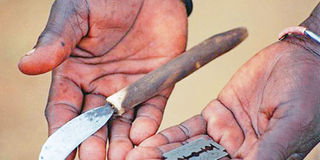Police arrests five in crackdown on FGM

A woman displays the tools used in FGM. COURTESY PHOTO
What you need to know:
- The Sebei sub-region police spokesperson, Mr Rogers Tayitika, confirmed three girls have been arrested but could not delve deep in details.
- He said, to avoid detection; parents are having their girls secretly circumcised, with those living near the international borders taking their girls to Kenya to undergo the rite but added quickly that police is on alert.
Police in Kween District have arrested five people for taking part in Female Genital Mutilation (FGM).
It’s alleged that three girls who were found dancing and two surgeons [traditional circumcisers] are being held at Ngenge police station in Kween District.
The operation comes after some of the girls and women were reportedly circumcised in the sub-county at the beginning of this month.
Ms Beatrice Chelangat, the director general of Reproductive Education and Community Health (REACH), an advocacy NGO against FGM, told Daily Monitor that the three girls were arrested after they fermented local brew and danced openly in preparation to undergo FGM.
Although President Museveni signed the law prohibiting Female Genital Mutilation (FMG) seven years ago, the practice still persists among the traditional Sabiny and Karimojong communities.
Reports on ground indicate that over 17 girls and women have so far been circumcised in Ngenge Sub-county in Kween District in Sebei sub-region this year. They are reportedly nursing their wounds in the hidden places away from police reach.
Ms Chelangat revealed that even as the government and non-governmental organizations step up efforts to rescue girls across Sebei and Karamoja Sub-regions from the practice, parents and guardians are devising ways of ensuring that their girls are circumcised without facing the wrath of the authorities.
“I want to say that this year alone more than 17 girls have been circumcised in Ngenge sub-county alone and this is being done with the consent of the parents even when they are aware that there is a law against FGM,” said Ms Chelangat.
The Sebei sub-region police spokesperson, Mr Rogers Tayitika, confirmed three girls have been arrested but could not delve deep in details.
He said, to avoid detection; parents are having their girls secretly circumcised, with those living near the international borders taking their girls to Kenya to undergo the rite but added quickly that police is on alert.
“It’s a bit hard to know when these girls have been circumcised nowadays. You will only know that they have undergone the cut after several weeks, when they have already healed but the girls we have arrested were dancing openly as though there was no law against the practice,” said Mr Tayitika.
FGM, among the Sabiny [those who hail from Kween, Kapchorwa and Bukwo] is still widely seen as a prerequisite for marriage.
Mr Saul Chebet, the Kween District, a senior community development officer said that while there have been no recent studies on the FGM prevalence rate, there is evidence to show the numbers have reduced drastically after the law; Prohibition of Female Genital Mutilation Act, 2010.
He however added that a lot more work still needs to be done to eradicate the practice because FGM is a deep-rooted culture and you cannot wipe out a culture at once.
He revealed that in the FGM hotspots, female circumcision is no longer a ceremonial event held once every year and that it also takes place sporadically such as when a woman is giving birth.
Mr Chebet explained that November and December is the “season” for FGM because schools will have closed and the maize is high, fields are bushy, so people hide in the fields to do it.




